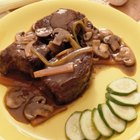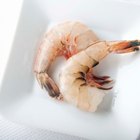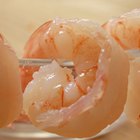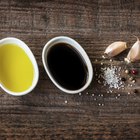Magone/iStock/GettyImages
The sharp, clean flavor of vinegar pairs well with the mild, slightly sweet flavor of shrimp. This makes it a suitable acidic ingredient for marinating shrimp. Simply pair the vinegar of your choosing with your favorite oil and herbs. Using different types of vinegar affects the overall flavor of your marinade. Since shrimp are more delicate than meats such as beef and chicken, you need to control your marinating time carefully to achieve delicious results without compromising the shrimp’s texture.
Timing Is Everything
If you leave your shrimp marinating for too long in a vinegar-based marinade, the protein in the shrimp begin denaturing -- the vinegar starts breaking the bonds that hold the protein together, which causes the protein molecules to unwind, eventually binding tightly together while squeezing moisture out of the shrimp, leaving you with tough shrimp. By limiting your marinating time to a maximum of 30 minutes, you can avoid ending up with rubbery shrimp while maximizing flavor with the vinegar of your choice. If you're worried about ruining your shrimp's texture, you can reduce the amount of vinegar in your marinade and use one part of vinegar to four parts of oil.
Using Different Types of Vinegar
With the wide variety of vinegars available in grocery stores and markets, you can easily change the flavor simply by using a different type of vinegar to marinate the shrimp. Shrimp pairs particularly well with balsamic vinegar, an aged wine vinegar that has a sweet taste and dark color. Other vinegars that are well suited to using for shrimp include sherry vinegar, red and white wine vinegars, tarragon-flavored vinegar and rice wine vinegar, which offers a lightly sweet and tart flavor.
Preparing the Marinade
The amount of marinade that you use varies depending on the recipe you're following. As a general rule, plan on using at least 1/2 cup for every pound of shrimp you're marinating. Since shrimp is marinated only for a short time, maximize the flavor potential by making sure that the oil is emulsified. Otherwise, you run the risk of having the shrimp unevenly coated, with uneven results. For best results slowly whisk the oil into the vinegar, breaking the oil into small droplets that stay suspended in the marinade, allowing the mixture to evenly coat the shrimp. You can achieve good results with a wire whisk or by adding the oil, vinegar and any aromatic ingredients you're using into a blender to whip up your shrimp marinade.
Tips
Since vinegar is an acidic ingredient, avoid marinating your shrimp in a metal container or bowl, which can react with the acidity of the vinegar and affect the flavor of your shrimp. Instead, choose glass, ceramic or earthenware bowls or resealable plastic bags. Marinate the shrimp in the refrigerator to avoid contaminating the shrimp with bacteria. Once you transfer the shrimp to the grill or a pan, discard the marinade or transfer it to a small pot and boil it for three to five minutes to kill any bacteria. After boiling it, you can then use the marinade to baste the shrimp as it cooks.
Related Articles

Does Chicken Go Bad if You Marinate It ...
Chicken Marinade With Corn Starch and ...

Can I Bake Frozen Breaded Shrimp Rather ...

How to Inject a Brisket

How Long Can Shrimp Be Refrigerated?

How to Use Leftover Marinade in Gravy

Soaking Shrimp or Scallops in Lime Juice

How to Fry Shrimp With Potato Starch

How to Straighten Shrimp for Tempura

How to Prepare and Eat Raw Shrimp

Jumbo Shrimp Nutritional Facts

Can I Start Marinating While My Chicken ...
How Long Can You Marinate Meat Before ...

How to Thaw Frozen Cooked Shrimp Quickly

Can You Deep-Fry Frozen Uncooked Shrimp?

How to Remove Eyeglass Coating With ...

How to Cook Langostinos

How to Mix Your Own Vinegar & Oil

How to Marinate Bratwurst

What Kind of Oil Should I Use to ...
References
Writer Bio
Caryn Anderson combines extensive behind-the-scenes writing experience with her passion for all things food, fashion, garden and travel. Bitten by the travel bug at the age of 15 after a trip to Europe, Anderson fostered her love of style and fashion while living in New York City and earning her degree at New York University.